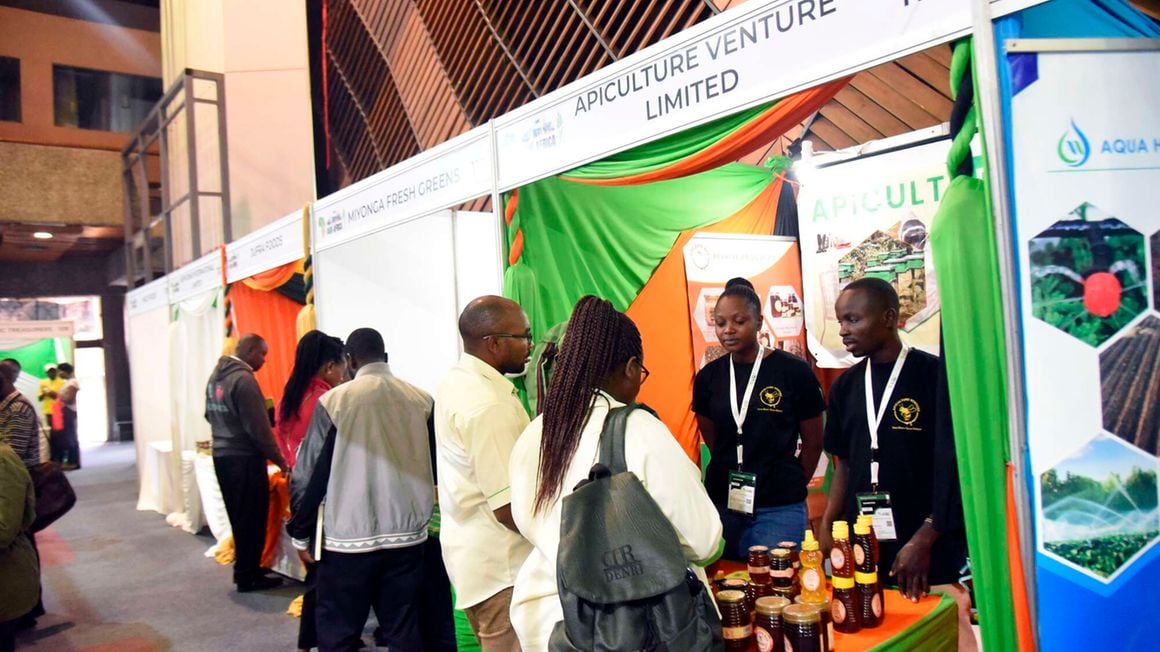
Visitors at Apiculture Venture Limited stand dealing in honey products during the 2023 Agri-Africa Expo and Conference at KICC in Nairobi on May 9, 2023. PHOTO | EVANS HABIL | NMG
Towards the end of March this year, Agri-value chain actors converged in Nairobi for
the Global GAP Tour Stop conference to discuss and formulate a permanent solution that ensures agricultural exports meet standards for global market access certification.Certification and standards are essential to any country's industrial operations, economic development, and compliance with global norms.
As such, Kenya has established its industry certification and standards within the agricultural sector to ensure it meets necessary requirements and keeps up with the rest of the world in ensuring that only quality agricultural produce reaches the consumer.
The forum couldn't be more apt, especially for our economy, given that agriculture is the mainstay of Kenya's economy.
Studies by the Central Bank of Kenya show the sector accounts for 47 percent of Kenya's Gross Domestic Product (GDP) directly and indirectly through its linkages with other sectors.
The sector employs also 40 percent of the total population, and more than 70 percent of the rural population relies on agriculture for their daily livelihoods.
However, the sector continues to face several challenges, such as climate change and macroeconomic challenges, resulting in stagnant yields and ultimately food insecurity.
Inaccess to markets increases post-harvest losses, and unstructured value chains equally add to the burden on value chain actors within the agricultural sector.
As a result, it is estimated that nearly a third of Kenya's agricultural production worth billions of shillings goes to waste due to fragmented supply chains, non-climate smart agricultural practices, and poor infrastructure.
Last year, I had the privilege of attending the Fruit Attraction Fair in Madrid, Spain, which brought together leading exporting countries, global logistic companies, input and machinery providers, and larger exporters to upcoming players from developing countries.
From my interactions with Kenyan fresh produce exporters, I noted that the challenge was meeting the standards and certification requirements for produce entering the European market.
Similarly, most exporters intimated the need for more technical knowledge on how to package their produce for the global market.
Lessons learnt from the conference and my visit to Spain show that there is a need for the private sector to support Kenya’s Agri-SMEs holistically to meet certification requirements locally and remain globally competitive as buyers are guaranteed that the goods and services meet certain levels of safety, quality, and performance, which are vital when operating in a global market.
Moreover, certification and standards ensure that Kenyan businesses can compete in a global market. By following these standards, firms will be able to produce quality goods and services that can be sold around the world.
This helps to further Kenya’s objectives of economic development, as much-needed foreign investments and jobs are created.
Reliable market access also boosts productivity, improves livelihoods, and strengthens food security. It can also contribute to reducing poverty and hunger for producing families and their communities if appropriate measures are taken to cut market risks and unequal market power.




No comments :
Post a Comment